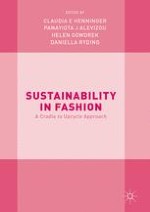2017 | OriginalPaper | Buchkapitel
6. Ethical Consumption Patterns and the Link to Purchasing Sustainable Fashion
verfasst von : Claudia E. Henninger, Pallavi Singh
Erschienen in: Sustainability in Fashion
Aktivieren Sie unsere intelligente Suche, um passende Fachinhalte oder Patente zu finden.
Wählen Sie Textabschnitte aus um mit Künstlicher Intelligenz passenden Patente zu finden. powered by
Markieren Sie Textabschnitte, um KI-gestützt weitere passende Inhalte zu finden. powered by
